9 Best DJ Mixers for Beginners in 2022
DJ mixers are an intrinsic component of the DJ setup and you simply cannot mix without them, unless, of course, you’re going for controllers that have built-in mixers. For any setup which includes decks, though, you’ll need a DJ mixer.
DJ mixers come in many different formats with lots of features that range from the simplest small-format 2 channel mixers to mixers like Pioneer’s ridiculous DJM-V10 6-channel mixer. The V10 is probably the most advanced and expensive mixer ever built coming in at over $3,000! Pretty crazy, right?!
For this review, though, we’ll be focussing on beginner DJ mixers. These fulfill the basic principles of mixing to get you started on your DJ journey!
| Product | Features | |
|---|---|---|
| Behringer VMX100 USB | 2-channel; Slim price tag; BPM counters; USB slot for recording mixes; | PRICING |
| Numark M2 | Two channels; 3-band EQ; Line and phono inputs; Two RCA outputs; | PRICING |
| Numark M4 | 3 channel mixer; 3-band EQ; Line and phono inputs; | PRICING |
| Numark M6 USB | 4 channel mixer; 3-band EQ; Line and phono inputs; | PRICING |
| Pioneer DJ DJM-250 Mark II | Excellent hardware; USB functionality; RekordBox bundled with it; XLR outputs; | PRICING |
| Behringer NOX101 | Awesome hardware; Jack and RCA outputs;Strong and attractive chassis; | PRICING |
| Roland DJ-99 | All input types covered; Excellent hardware; Sleek design; | PRICING |
| Behringer Pro Mixer DJX750 | 4 channels; Lots of features; Well built and durable; | PRICING |
| Gemini MM1 | Minimalistic design; Clean sound and good hardware; Well built; | PRICING |
A DJ mixer’s fundamental job is to take multiple audio signals, mix them and then output them. They involve inputs and outputs, the inputs are used to connect your decks and the outputs are used to connect your speakers. The mixer itself, then, is essentially a middle-man or junction box.
It allows you to organize and control your audio creatively before sending it on to its final destinations, the speaker systems and eventually, to the crowd!
The Standard Features of a DJ Mixer
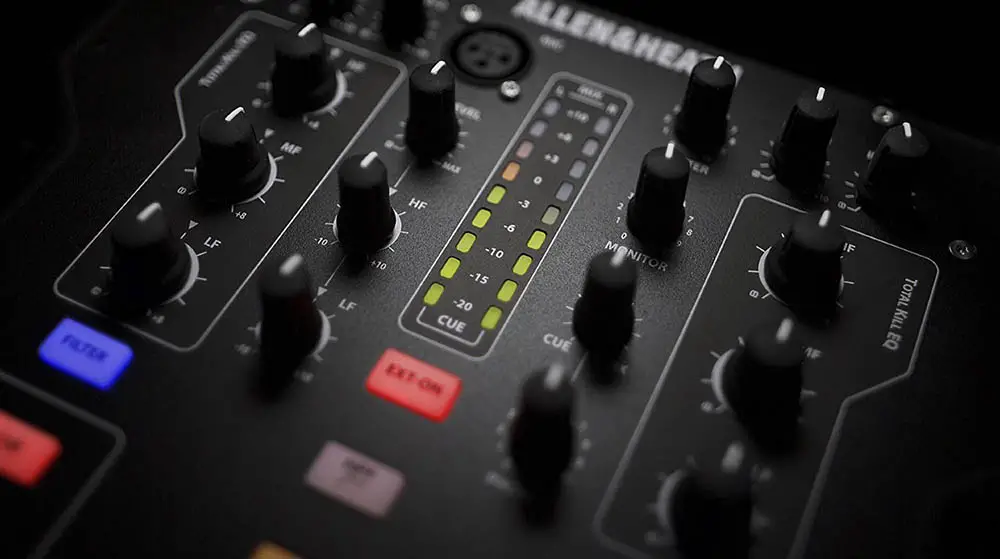
So what can we expect from a beginner DJ mixer? Let’s first look at the basic fundamental components of a mixer:
Inputs and Outputs – I/O
As outlined, mixers have inputs and outputs. Inputs connect to your decks and come in two varieties:
- Line
- Phono
Your mixer may have two inputs for each one or it might have a button you press to tell the mixer which type of input you’ve connected. Always check and make sure.
Line is designed for digital sources such a CDJs. The digital line signal is much stronger than that which comes out of a vinyl deck, which is a phono signal.
Phono signals need a different input as they’re pre-gained to make them louder. A signal from vinyl is much smaller than a signal from a CDJ and needs to be turned up.
Outputs, on the other hand, are usually simpler. Beginner mixers will usually have a couple of RCA outputs, one for the main speakers and one for monitors. More expensive mixers might have XLR outputs or jack outputs for monitor speakers, it depends. Mixers may also have a rec out for connecting to a recording device.
Channels and Channel Faders
Mixers have at least two channels and each of these is accompanied by its own channel strip and fader. Your volume fader controls the volume of that channel. You will also have a crossfader which blends signals from 2 channels.
Gain Controls
On each channel strip, you will find a gain control. Gain is similar to volume, it boosts the audio signal to make it louder. Gains are important to understand and set correctly. You need to set your gain so you’re getting a loud signal out of the mixer but without clipping or redlining the mixer itself.
Turn the gain up to somewhere in the yellow, or ¾ up the meter. Make sure it isn’t clipping and then leave it! The only reason you should be changing your gain after you set it up is to adjust a particularly quiet song – if you do this then make sure you turn it down again!
EQ
EQ are usually 3-band even on cheap beginner mixers. A 3-band EQ has high-frequency control, middle-frequency control, and low-frequency control. These are your main creative mixing tool, you can use them to adjust songs to properly blend them together in the mix.
Cue
Cue buttons allow your songs to be played through your DJ headphones. Pressing the cue button on two tracks allows you to listen to both simultaneously to line up your music. You can also depress the master cue button which allows you to listen to your master output – this will allow you to hear what is coming out of your main speaker system.
Behringer VMX100 USB 2 Channel DJ Pro Mixer
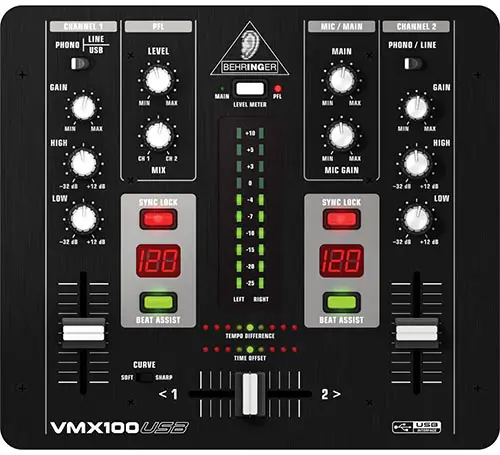
Behringer have a strange reputation, they’ve been very well known for their budget DJ mixers yet everyone seems to give them some flack. The VMX range changed this, though, they very hard to knock and have been received very well by DJs.
These are budget mixers with some top components, it can be hard to get right as often you feel something has to be sacrificed whether it’s build quality or other components but the Behringer VMX range seems somewhat bulletproof.
This very well built mixer has good quality Ultraglide faders and high-quality phono preamps which make vinyl sound great. They also have a USB slot so you can record mixes internally which is awesome. 3-band EQs including a 2-band master EQ, mic input and digital BPM counters complete this high-tech compact little mixer.
Pros
- Slim price tag
- BPM counters useful for vinyl mixing
- USB slot for recording mixes
Cons
- No XLR output
The Numark M range are all budget mixers perfect for beginners so they’re all worth a mention.
Numark M2
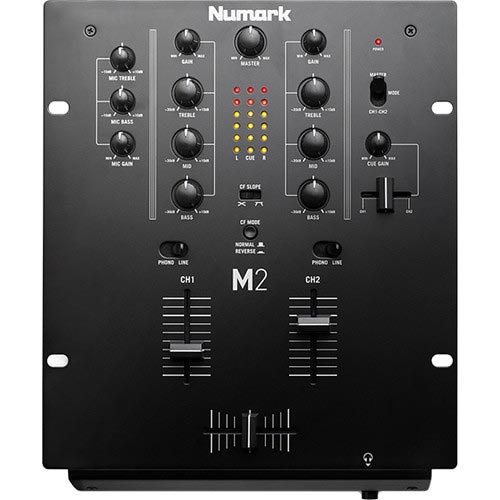
A basic, cheap and effective two-channel mixer, the Numark M2 is a perfect entry-level mixer or backup. It is well built, has all the necessary features and is ultra-portable. For the price, you can’t really ask for much more and it’ll serve you night in night out no matter whether you’re practicing, partying or gigging.
- Two channels
- 3-band EQ
- Line and phono inputs
- Two RCA outputs
Numark M4
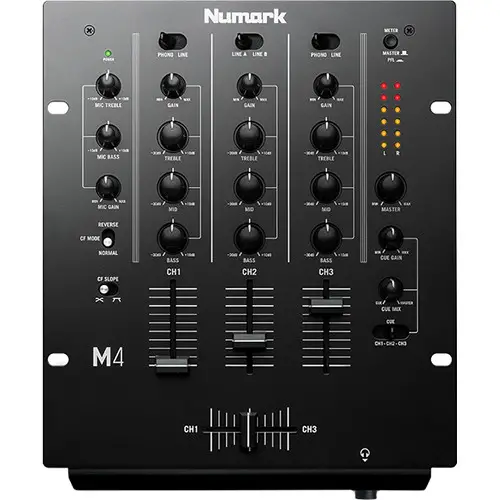
Here’s one for those who have more than 2 decks or otherwise need that 3rd channel for other equipment. Not all beginner DJ mixers need to be limited to 2 channels and this 3 channel mixer offers some expandability and flexibility to those looking for the potential to add extra equipment to their setup.
By all accounts, Numark are a highly experienced and valued audio tech manufacturer who are well known for their budget products so it’s no surprise that this mixer comes at a slim price considering its extra channel.
Numar M6 USB
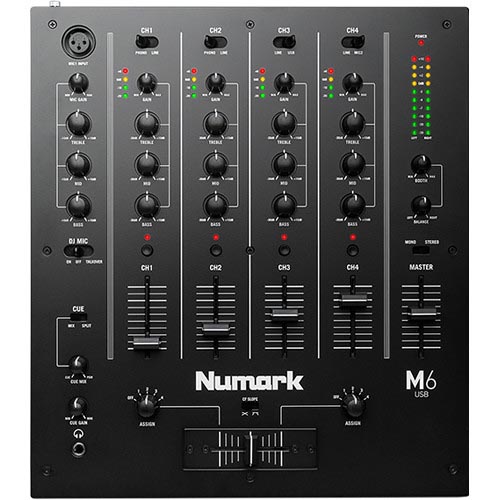
The biggest of the M range, the M6 USB, is a 4 channel mixer with some other upgrades and USB functionality. It’s outfitted with a good quality crossfader and other hardware and features a total of 4 outputs – 3 RCA outputs and 1 XLR output. The USB function allows you to mix in music from a laptop or record your sets directly.
It’s an excellent quality mixer that packs a punch for the money and for beginner DJs looking to expand their setup, it’s a cut above many similar mixes and a cut below in price. For the money, this is the best and actually one of the only 4-channel mixers around.
- Four channels
- 3-band EQs
- 4 outputs
- USB functionality
Pioneer DJ DJM-250 Mark II
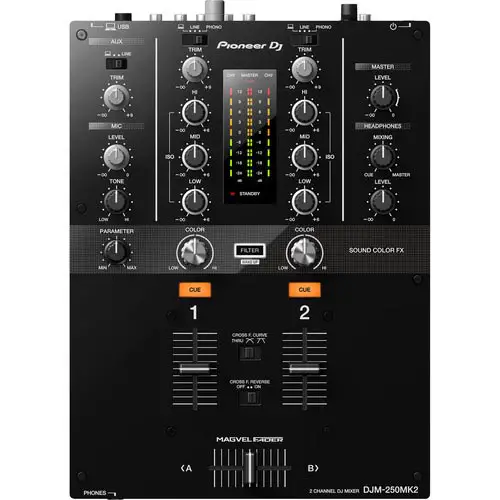
Pioneer DJM mixers are the industry standard and once you have one, you’ll likely hold onto it for a very long time. This is Pioneer’s cheapest and smallest DJM mixer, perfect for beginners who are looking for a pro bit of kit which is well respected, reviewed and tried and tested to the absolute limits.
The DJM-250mkII features Magvel faders which are a joy to use, is USB operable for playing tunes from a laptop using RekordBox or for recording your mix directly and with XLR outputs, you won’t be stuck connectivity-wise.
It’s a fantastic mixer that is superbly well built and optimized for pro-level club use. It’s pricey but for Pioneer, this is beginner entry-level prices. On the bright side, an investment into this mixer is sure to get you off on the right foot.
Pros
- Excellent hardware
- USB functionality
- RekordBox bundled with it
- XLR outputs
Cons
- Expensive
Behringer NOX101 DJ Mixer
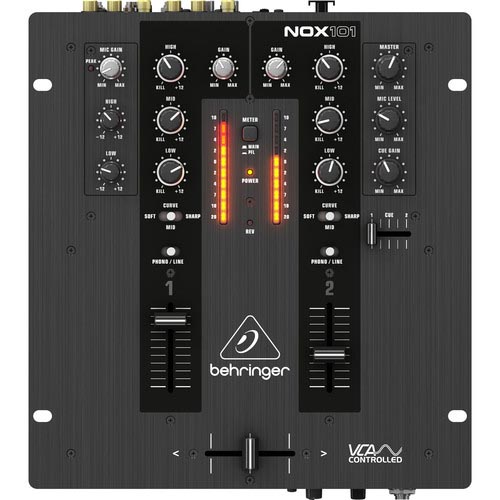
Behringer up again and this time with the modernized super-cool looking NOX101. It boasts many top-level components that push above its price range including excellent quality phono preamps which will enhance the sound of vinyl.
A XENYX mic preamp tops off an impressive hardware set. This is all packed into a swish chassis that is built with durability in mind, it looks mean and for the money, it lays down the gauntlet somewhat – a great 2-channel mixer at a great price.
Behringer has a mixed reputation but the NOX101 smashes this up and replaces it with something very respectful indeed.
Pros
- Awesome hardware
- Has jack and RCA outputs
- Strong and attractive chassis
Cons
- Only rudimental features
Roland DJ-99
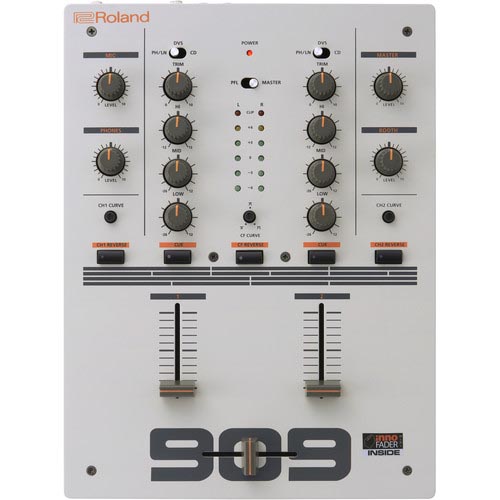
Roland are better known for their synthesizers and digital instruments but they recently launched this lovely little mixer alongside their very own vinyl turntable. It’s an elegant bit of kit which looks quite unique, very clear and easy to use, and with impressive hardware at a slim price, there’s nothing here not to like.
The Roland DJ-99 is feature light but interestingly, it does have combo inputs. Each channel has 3 inputs, you can choose between line and phono or a dedicated DVS input which is optimized for DVS-specific vinyl decks. It’s finished with an innoFADER crossfader that feels super smooth and fun to use.
Pros
- All input types covered
- Excellent hardware
- Looks awesome
Cons
- None
Behringer Pro Mixer DJX750
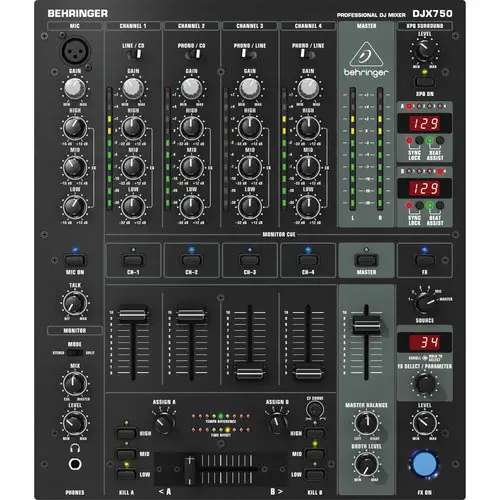
Another Behringer, though this is a 4-channel mixer which features a host of extra features and effects. This mixer is a real warrior, ask many a DJ and they’ll tell you all about the DJX750, it’s been around for a while and it’s certainly done the rounds – it’s basically a household name!
This mixer is pretty much decked out with everything you need ranging from an extensive selection of inputs and outputs, BPM counters for vinyl mixing and a decent FX module. It has decent hardware and it’s proven to stand up to some abuse. It’s not much to look at and it might not seem solid but for the money, it’s hard to find a similarly well-featured 4-channel mixer.
This mixer is a great beginner mixer for someone looking to future-proof their setup against further expansion, it’s worthy of plenty of consideration.
Pros
- 4 channels
- Lots of features
- Well built and durable
Cons
- Getting a bit old, could use some updates
Gemini MM1

This tiny mixer is superb for practicing on the go, traveling or for bedroom use. Now, this mixer is super-compact so you can’t expect anything other than the very, very basics but it does what it sets out to do very well.
It only accepts line inputs, so vinyl is out of the question, but it still has 2 outputs so you can connect to speakers and monitors/recording devices using the rec out.
Simple and minimalist, this tiny mixer gets the job done for beginners and pros alike who are looking for a small but high-performance mixer.
Pros
- Tiny!
- Clean sound and good hardware
- Well built
Cons
- Very basic
Summary
DJ mixers range from the massive to the tiny, from many channels to just a few, there are excellent selections on offer and for beginners, there’s probably more choice than ever.
Here we have at least nine excellent mixers that provide beginners with everything they need to get mixing, other than the decks themselves of course.
The minimal 2-channel mixers available here include the DJM-250Mark II, which is by far the most expensive, as well as the Gemini MM1, the smallest and cheapest, the Roland DJ-99, which is smart and well built, the NOX101 which packs some awesome hardware, the Behringer VMX100 which is an industry veteran and the Numark M2, an extremely effective compact mixer. All of these deliver the goods for anyone looking for a decent 2-channel mixer.
The DJM-250 Mark II is by far the best mixer here, it has awesome build quality, USB functionality, great hardware and with XLR outputs, it’s designed for pro-level use. Yep, it’s pricey, but it’s Pioneer so that’s to be expected. Beginner DJs looking for a pro-level piece of kit that’ll last them years should look no further.
Of the larger mixers, the Numark M4 and M6 are hard to beat at the prices but the Behringer Pro DJX750 has been around for many years and it’s still battling on!
You may also like: